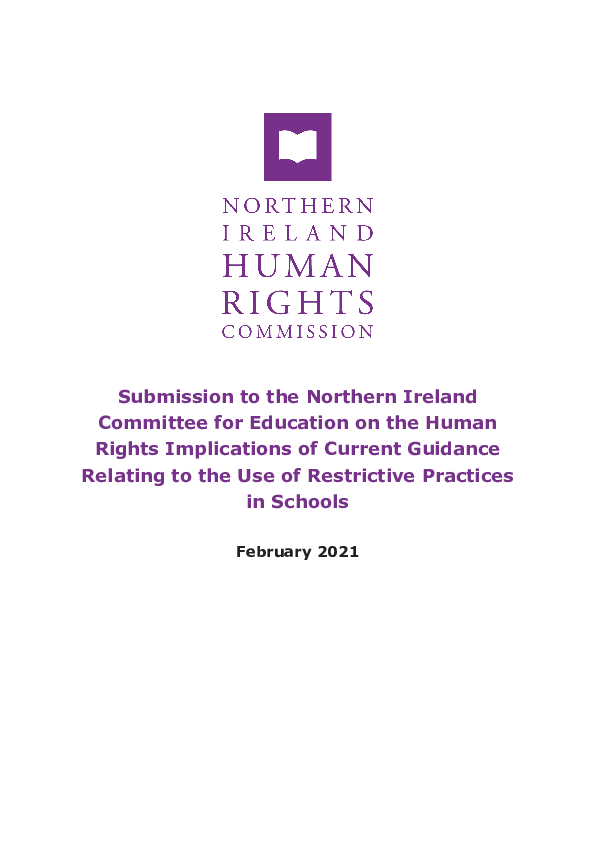Submission: NI Committee for Education on the Human Rights Implications of Current Guidance Relating to the Use of Restrictive Practices in Schools
Last Updated: Monday, 19 April 2021
Read the NI Human Rights Commission submission to the Northern Ireland Committee for Education on the human rights implications of current guidance relating to the use of restrictive practices in schools.
Date produced February 2021.
Below is a summary of the recommendations.
You can also download the full document through the links provided.
The Northern Ireland Human Rights Commission (NIHRC) recommends:
- 2.15 The NIHRC advises that restraint and restrictive practices should be used as a matter of last resort, in circumstances where a child is at risk of harming themselves or someone else.
- 2.16 The NIHRC recommends that comprehensive guidance is produced on the application of restrictive practices in an education setting. This guidance should include a definition of “restraint”, in line with international human rights standards.
- 3.6 The NIHRC recommends that the DoE produce guidance on the use of seclusion in school settings. This guidance should include a definition of “seclusion” and give clear direction on when and how it can be applied in line with international human rights standards.
- 4.7 The NIHRC advises that the use of restrictive intervention to maintain good order and discipline risks non-compliance with Article 3 ECHR. The NIHRC recommends that the Education (Northern Ireland) Order 1998 be amended to remove Section 4(1)(c) to ensure that restrictive interventions are not used to maintain good order and discipline. Guidance from the Department of Education should be updated to reflect this.
- 5.13 The NIHRC advises that, restrictive interventions and seclusion should not be used to restrain or control children with special educational needs and disabilities. Guidance on how this operates in practice should be produced in consultation with children with special educational needs and disabilities, their parents and guardians, educators and any other relevant stakeholders.
- 5.14 The NIHRC recommends that the Department of Education produce specialised guidance on alternative approaches and interventions for children and young people with special educational needs and disabilities in school settings. This should be developed in consultation with children with special educational needs, parents and carers, educators and other relevant stakeholders, to ensure the specific needs of children are met.
- 5.15 The NIHRC recommends that the Department of Education allocate appropriate resources and funding to schools to ensure that reasonable accommodations are made for those children and young people with special educational needs and disabilities in school settings.
- 6.9 The NIHRC recommends that all staff working within grant aided schools, who are authorised to use restrictive interventions, receive standardised training on when it is appropriate to use these measures and how to do so safely. This training should include reference to human rights and be sensitive to the additional needs of children and young people with specialised educational needs and disabilities.
- 6.10 The NIHRC recommends that any training on restrictive practices and seclusion is clear that these measures are to be used as a last resort, to intervene where a child may cause harm to themselves or others and only when other preventative measures have been exhausted. Statutory training should also include alternative interventions to restraint and seclusion to better equip teaching staff, particularly pertaining to children and young people with special educational needs.
- 7.6 The NIHRC recommends that a duty be placed on schools to record every incident of restraint and/or seclusion used on a child. These reports should make every effort to seek the views of the child on the incident that occurred in line with article 12 of the UNCRC.
- 7.7 The NIHRC recommends that the Department of Education produce a standard recording template to collect and publish disaggregated data on the use of restraint and seclusion in grant-aided schools in NI so that its frequency and impact can be appropriately monitored, in line with the recommendations of the Committee on the Rights of the Child.
- 7.8 The NIHRC recommends that guidance policy on the use of reasonable force for restraint and seclusion requires schools to inform a parent or guardian where these interventions have been used on their child, particularly where the child has special educational needs.

Download Documents
Your browser is out-of-date!
Update your browser to view this website correctly. Update my browser now